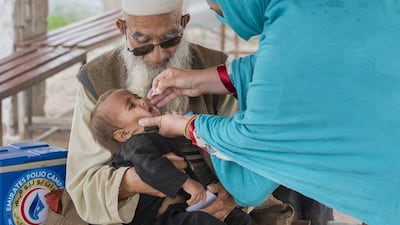The UAE aims to make its mark in the field of humanitarian work. It has achieved this aim by launching a series of initiatives to confront challenges and strengthen global resilience to natural disasters. The UAE’s efforts have helped ease the burden of those hit hardest by disaster or tragedy, especially those living in poverty-stricken countries.
In fact, one of the key pillars of this country's foreign policy is humanitarian work. Several factors set our philanthropic initiatives apart.
First, they are endorsed at an institutional level and often enjoy the direct support of the country's leadership.
Second, these initiatives are not just limited to providing material assistance to needy people and helping to ease their suffering, but also involve officials visiting crisis-ridden areas in person.
Third, these efforts have been an integral part of the UAE’s foreign policy since the very day the country was formed in 1971.
Fourth, the country's aid is always a purely humanitarian act and bears with it no political connotations. And lastly, the UAE's aid reaches individuals in need regardless of religion, sect, colour or race.
There are extensive statistics that prove that the UAE’s humanitarian approach is a core part of its foreign policy. One needn't look further than the figures.
According to reports from the Development Assistance Committee of the Organisation for Economic Co-operation and Development, the UAE ranked first in the world in 2013, 2014 and 2016 as an international donor to Official Development Assistance. The country also came second in 2015.
The country donated almost $6 billion (Dh22 billion) in foreign aid in 2013, meaning the country also ranked first for having the highest development assistance percentage of gross national income, having given 1.3 per cent of its GNI as ODA and thus exceeding the UN target of 0.7 per cent for donor countries – a percentage only a few other UN member states actually reached.
In 2014, the UAE gave $6.16 billion, or 1.26 per cent of GNI. In 2015, the country gave $8.8 billion, 1.09 per cent of GNI.
Indeed, these consecutive examples have proven a source of inspiration for other donors. Two initiatives, in particular, stand out in that they have attracted the attention of the international community and humanitarian organisations. These are the UAE Water Aid (Suqia) campaign and the Polio Eradication Initiative.
Three years ago, Sheikh Mohammed bin Rashid, Vice President and Ruler of Dubai, launched the UAE Water Aid Foundation, which aimed to provide clean drinking water to 5 million people around the world at the time. The campaign concluded with great success after raising Dh180 million in 18 days, which was enough to provide 7 million people with clean water.
________________
Read more
UAE ranked among top 10 most generous nations
________________
The following year, Sheikh Mohammed also announced that the foundation would be listed as a non-profit organisation under the umbrella of the Mohammed Bin Rashid Al Maktoum Global Initiatives, which primarily aims to find long-term sustainable solutions to water shortages.
Although the organisation is still in its early years, it has already made great strides, quickly becoming a leading organisation at providing clean drinking water to disadvantaged people around the world. In addition, what makes it stand out from other similar organisations is its focus on research and development in using solar energy to desalinate and purify water.
In co-operation with the Mohammed bin Rashid Al Maktoum Humanitarian and Charity Establishment, UAE Water Aid has so far carried out 10 projects in Somalia, Tajikistan, Afghanistan, Ghana, Yemen and Benin, which have provided safe drinking water to about 60,000 people.
If there is anything such initiatives show, it is the takes to help maintain the dignity of millions of people who are suffering from poverty, deprivation and disease.
According to World Health Organisation statistics, a child dies every 21 seconds due to diseases related to drinking contaminated water. The WHO also estimates that almost 10,000 people die every single day either from these diseases or from thirst. The importance of such initiatives cannot be overstated.
One of the pioneering international humanitarian initiatives of Sheikh Mohammed bin Zayed, Crown Prince of Abu Dhabi and Deputy Supreme Commander of the Armed Forces, was his programme to help eradicate polio worldwide. The initiative received a huge amount of international attention and appreciation.
In its efforts to create a polio-free world within the next few years, the UAE has launched extensive global campaigns, providing oral polio vaccines for children under the age of 15 and accelerating efforts to eradicate the last remaining polio hotspots in the different regions of the world.
The initiative came within this global mission to eradicate polio and is at the forefront of the UAE's efforts to save children from easily preventable diseases. Launched by Sheikh Mohammed in 2011, the initiative has played a key role in countering this deadly disease.
________________
Read more by Jamal Al Suwaidi
________________
In fact, Sheikh Mohammed entered into a strategic partnership with the Bill and Melinda Gates Foundation to provide a total of $100 million in funds, split in half between the two parties, to purchase and provide vaccines for children in Afghanistan and Pakistan.
In 2013, Sheikh Mohammed also donated Dh440 million to support global efforts to eradicate polio by next year, with a special focus on Pakistan and Afghanistan.
In short, the UAE has borne its fair share of international social responsibility. Scarcity of water resources, drought and polio are issues that continue to challenge governments around the world. There are many factors to thank for the UAE’s efficiency at rising to these challenges and helping to increase and maximise aid effectiveness.
Among them, the UAE works in philanthropy apolitically, raising zero suspicion of funding extremism. This is why its endeavours are always welcome, not just by international charity organisations, but by governments around the world.
Dr Jamal Sanad Al Suwaidi is the director general of the Emirates Centre for Strategic Studies and Research
Follow The National's Opinion section Twitter

